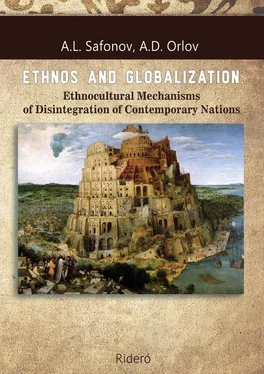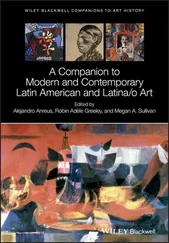The world-systems approach to globalization as a process of increasingly multi-faceted and all-encompassing interaction of social agents and beings is used by Braudel 116 116 Fernand Braudel, A History of Civilizations, New York: Penguin Books, 1993
, Amin, 117 117 Amin, Samir. The American Ideology. M., 2005. – p. 211—219.
, 118 118 Amin, Samir. Political dimension // Globalization of Defiance. Translation. M., 2004. – p. 265—286.
Wallerstein, 119 119 Wallerstein, I. World-Systems Analysis: An Introduction – M.: Publishing House Territoriya Buduschego, 2006. – 248 p.
and others.
The approach to global development based on resources and ecology – one of whose variants, the sustainable development concept, became the basis for UN policies on demographics and development – has been considerably influential. This approach is based on objective natural resource limits (the “natural ceiling’), on economic activity and, as a result, on optimal population size. Nevertheless, the concept of the crisis of resources and demographics, while it does single out objective issues, cannot in principle be used to describe and make a prognosis for the social component of this crisis and how it could play out.
The correspondence between convergent and divergent social processes may be the basis for a classification. The philosophers who created the concept of humankind’s multi-stage development towards a single global social community can be considered the forerunners of modern globalistics, and one could single out the fundamental works in this field by Kant, Marx, Teilhard de Chardin, Vernadsky, Toynbee, Russell, Jaspers and others.
Representatives of the civilizational approach, who emphasize the unexpectedly stable preservation of sociocultural communities and cultural-civilizational differences even in a connected economic and social community, insist on the restricted nature of the convergent tendencies of globalization in the sociocultural sphere.
Most existing theories and concepts are based on the reduction of globalization as an all-encompassing phenomenon into separate, although significant, phenomena of economic, sociocultural and political character.
In addition to the above, convergent aspects of development (monopolization and unification, including ethnocultural) are being seen in absolute terms and the phenomenon of social regression is being denied as an objective tendency, an attribute of globalization.
It is equally important that globalization is a comprehensive system of major changes – often revolutionary or catastrophic ones – in separate spheres of the social being, a system that is not equal to the sum of its parts and engenders a qualitatively new level of difficulty of social phenomena in the new epoch.
The analysis and the prognosis for development of globalization processes are hindered by the crisis-like character of the changes, increasingly more likely to end in moving from the technical and social progress of the two previous centuries towards growing ungovernability and global catastrophe: the modern world is changing faster than the science community can reach a consensus on the character of the changes.
The threats and challenges posed by globalization are not limited to the objective problems related to resources, ecology and economy on which the scientific community focuses. Global threats of a social kind, subjective in nature and linked to the transformation of the system-building social communities – in particular, national and ethnic ones – play an equally important role.
Ethnocultural fragmentation of civil nations is a new global threat eliciting not only the establishment of new ethnic and religious conflicts and the energizing of the old ones, but also new forms of their establishment and development. Thus, the clash of civilizations assumes not an intergovernmental but an internal, diffusive character tied to the elimination of spatial borders and barriers.
It seems efficient to divide the phenomena that make up globalization into objective components, linked generally to the spike in limits on natural resources and the objectively inevitable establishment of the global economic and social space, and subjective components, linked to the activities of the social agents of global development, including large and socially important communities such as nations and ethnic groups.
One of the leading objective components of globalization is the increase in global connectivity – that is, economic, transport and information globalization, as well as a global crisis of resources and demographics.
At the same time, growth of the objective component of the global systemic crisis inevitably leads to subjective manifestations in the form of a confrontation between the social agents of the global process involved in the fight for the limited resources, not so much by the desire to reap benefits and rule, but by the necessity to save oneself.
Objective and subjective components should be singled out in the theoretical approaches to globalization. It has been established that the theories may be descriptive or prescriptive. When analysing theories and models of globalization, one should single out their objective, descriptive component, and the subjective component that reflects the peculiarities, interests and intentions of the agent that shows a preference for a certain theoretical approach.
The prescriptive component of social theory (including the theory of globalization), understood as an ideal model of society, plays a special part in forming nations and other social communities of political genesis. The national idea is nothing short of the social order controlling the masses and forming their common identity.
Therefore, one should single out an ideological, prescriptive component of the theory of globalization – in other words, a value-based message, aimed at a certain social group (target audience), born out of certain social agents (usually elites), using ideology as a social management tool actively shaping or “building’ social reality.
Therefore, comparative philosophical-methodological analysis of well-known theories and globalization concepts, created within various science disciplines, shows that most are based on the reduction of globalization as an all-encompassing phenomenon to separate, albeit significant, economic or political phenomena.
At the same time, most existing globalization concepts, apologetic and critical theories, exhibit absolutization of convergent aspects of the development, monopolization and unification, including the ethnocultural one.
The aforementioned limitations placed on theoretical approaches inevitably lead to cognitive restrictions that hinder the theory not only from making forecasts, but also from explaining the course of the global development post factum, necessitating a review of the sociophilosophical approaches used in certain social studies.
Globalization is usually described using the well-known categories of internalization of the economy and integration of states – in other words, from the point of view of economic determinism and the concept of world politics as the interaction of sovereign states.
However, globalization does not simply weaken nation states that reached their development peak in the twentieth century, including great powers, and erode nations as system-building social communities, but also brings to life new agents in the global game, new centres and power mechanisms that serve as alternatives to the nation state.
According to one of the most prominent contemporary philosophers and sociologists, the creator of social structuration, Anthony Giddens, 120 120 Giddens, Anthony. Runaway World: How Globalization is Reshaping our Lives. London: Profile, 1999. Translated to Russian. M.: Ves’ mir, 2004. – 120 p.
the process of globalization cannot be reduced to such substantial factors as information and communication technologies and the liberalization of trade and finance.
Читать дальше












